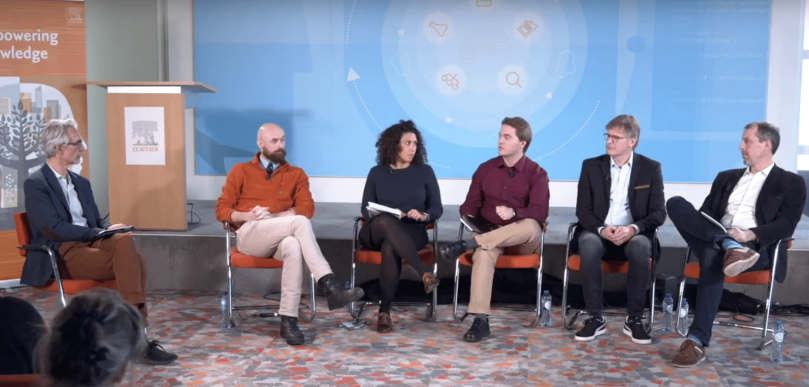On January 21, qBionano’s Mattias represented the Marie Curie Alumni Association in a panel debate entitled “How Researchers & Publishers Can Collaborate In The Move Towards Open Science” organized by Elsevier in Amsterdam. Below is the full video from the event. Mattias also shares a summary of key take-away messages in this blog post.
My three key take-home messages from the debate are the following.
- Open infrastructure must be supported. Researchers should never be restricted from reading or publishing research due to an inability to pay. The long-term goal should therefore be to have open infrastructure where there are zero author-facing fees and zero reader-facing fees. This is sometimes called platinum or diamond open access and is something I have discussed previously. Funders and publishers can take a leading role here by directly negotiating and establishing agreements that support open publishing infrastructure for the long term. In the short term, any and all publishers can embrace open science by simply following the “Royal Society-model” to Plan S readiness: i.e., zero embargo, green open access.
- The research evaluation system must be modernized. Funders and institutions should take a leading role here by modernizing their processes for recognizing and rewarding researchers (e.g. for decision around grants, hiring and promotion). DORA has established an excellent resource for good practices that are already established in this area. For example, any research funder can directly follow the recent incentivization blueprint from the Open Research Funders Group which provides a simple step-by-step guide (including template language) for modernizing research evaluation. At an institutional level it is important that researchers advocate for change, and take part in discussions around good practices in research assessment. For example, we recently had an event on the future of research assessment at my own institution (video recording available here). We researchers can also help push this important area by ensuring that we focus on the whole research process, and not solely on the outputs, as I have recently discussed.
- Researchers need support and resources to adopt best practices in open science. Almost all researchers want open science, but implementing good practices in the research workflow can be challenging. Excellent training resources exist for example through FOSTER and the Open Science MOOC. But while training is important, it is not sufficient by itself and the additional needs will vary by discipline. Funders and institutions can take a leading role here by engaging with researchers to identify and fill the gaps in support and resources needed for fully implementing open science research workflows. The goal is to make ‘open science’ just be thought of as ‘science’.
If you have any comments or thoughts from watching the video above, please feel free to reach out to me on Twitter @bearore.
Video details
- Event title: A debate on challenges and opportunities in open access & open data.
- Date: January 21, 2019
- Location: Amsterdam, The Netherlands
- Panelists (left to right)
- Gareth O’Neill, President of the European Council of Doctoral Candidates and Junior Researchers (Eurodoc).
- Gemma Hersh, Vice-President for Global Policy at Elsevier.
- Mattias Björnmalm, Vice-Chair Policy, Marie Curie Alumni Association.
- Wouter Haak, Vice-President for Research Data Management at Elsevier.
- Sylvestre Bonnet, Secretary of the Young Academy of Europe.
- Moderator: Stephane Berghmans, Director for Academic Relations at Elsevier.
- This video was originally streamed through Brighttalk.
Note: This blog post is published under a CC BY license.

